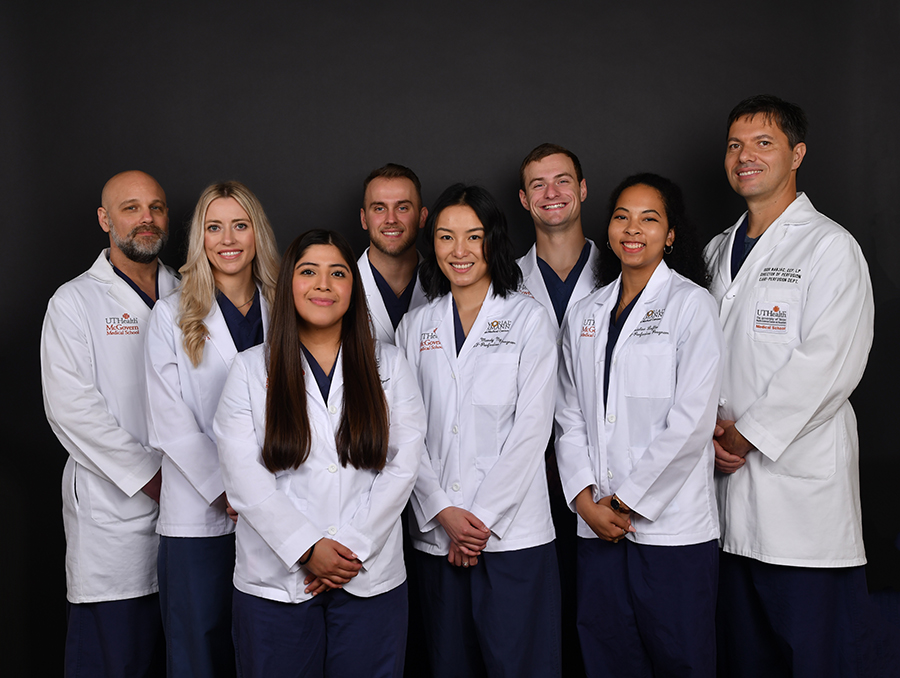Specialized training programs fill niche

McGovern Medical School is home to thousands of medical students, residents, and fellows, all here to gain expert training in their chosen profession. The school also offers a growing number of specialty education programs, providing vital training in highly specialized healthcare fields.
Two such programs, perfusion and cardiac electrophysiology, are a part of the Medical School’s Center for Advanced Cardiopulmonary Therapies and Transplantation.
The mission of the Cardiovascular Perfusion Program at McGovern Medical School, which started in 2015, is to provide the highest quality of education and training in cardiovascular perfusion through an accredited post-baccalaureate certificate program that meets state licensing and national accrediting agency requirements.
Perfusionists assist the cardiovascular surgical team during various types of cardiac surgical procedures by operating a heart/lung machine that artificially replaces these functions during surgery. At one year, the McGovern Medical School program is the shortest duration of the 17 perfusionist training programs in the United States.
The program includes training at five clinical sites, and to maximize clinical experiences, students learn didactics via a virtual platform.
“There has been a national shortage of perfusionists for at least the last decade,” said Rusty Roussel, program manager. “Dr. Igor Gregoric and Dr. Biswajit Kar didn’t merely want to help address that need. Instead, they envisioned UTHealth Houston becoming an exemplary center that produces exceptional graduates. Along with an amazing team of perfusionists, they’ve made that vision a reality.”
The program offers a 12-month post-baccalaureate curriculum leading to a certificate in cardiovascular perfusion. It is accredited by the Commission on Accreditation of Allied Health Education Programs upon the recommendation of the Accreditation Committee for Perfusion Education.
The program has graduated nearly 30 students and accepts six trainees per class. With classes starting in January, the deadline to apply for the next class is Aug. 1.
“Our graduates have a 100 percent pass rate for the American Board of Cardiovascular Perfusion board exams and a 100 percent job placement rate,” Roussel said. “The size of our class makes for an ample number of clinical cases for the trainee, as well as fosters a learning environment that is cooperative rather than competitive.”
“Our previous trainees have been recognized by the cardiovascular perfusion community on a national level with honors and scholarships, and our department has been awarded the Extracorporeal Life Support Organization’s highest designation a Platinum Center of Excellence for adult ECMO support,” added Igor Banjac, senior director of Perfusion Services.
The ten Broeke Family Foundation UTHealth EP Heart CV/EP Training Program at McGovern Medical School launched in 2018, providing a unique educational program for aspiring technical/clinical specialists in the fields of structural heart disease and cardiac rhythm management and electrophysiology.
“This program was conceived and initiated by Dr. Ramesh Hariharan to address the needs of both the cardiac medical device industry and hospitals/physician practices in search of qualified employees knowledgeable in cardiac rhythm management, electrophysiology and structural heart procedures,” explained John Boettcher, the program’s director. “Supporting these procedures and patient management requires intensive training and experience to contribute to exceptional patient outcomes.”
The six-month program provides education and training in cardiac rhythm management (CRM-pacemakers/defibrillators), electrophysiology (3D mapping/ablations), and structural heart disease for those interested in technical specialist positions in the medical device industry or clinical setting.
“Our one-of-a-kind program within the UT System provides the breadth and depth of training that can only be found in the Texas Medical Center through our affiliation with Memorial Hermann’s Heart and Vascular Institute and our electrophysiologists,” Hariharan said.
About eight students make up each class – offered twice a year, starting in January and July, with the capacity for up to 12. More than 70 students have graduated from the program since its start.
The program boasts a job placement rate of 97 percent.
“The program’s candidates have been very well received by both industry and hospital/physician employers,” Boettcher said. “Recruiting students has been the most challenging aspect of the program.”